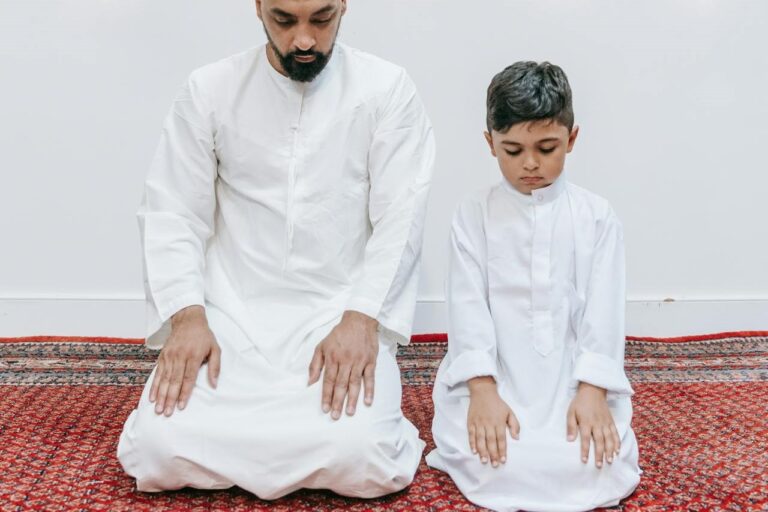How the Five Pillars of Islam Shape a Muslim’s Life
Islam is built on a strong foundation, much like a house supported by sturdy pillars. These pillars, also known as the five pillars of Islam, form the core of a Muslim’s faith and daily life, helping us stay connected to Allah and live with purpose. The Prophet Muhammad (peace and blessings be upon him) beautifully described this foundation in a well-known hadith. On the authority of Abu Abdul Rahman Abdullah bin Umar bin Al-Khattab, He said:
بُنَيَ الْإِسْلَامُ عَلَى خَمْسٍ: شَهَادَةِ أَنَّ لَا إِلَهَ إِلَّا اللَّهُ وَأَنَّ مُحَمَّدًا رَسُولُ اللَّهِ وَإِقَامِ الصَّلاةِ وَإِيْتَاءِ الْزَكَاةِ وَحَجِّ الَبَيْتِ وَصِوَمِ رَمَضَانَ
“Islam is built upon five things: to testify that there is no God but Allah and that Muhammad (peace be upon him) is His Messenger, to establish prayer, to give Zakat, to perform Hajj, and to fast in Ramadan.” (Bukhari and Muslim)
This hadith describes the five pillars of Islam in order. These pillars aren’t just rituals; they are acts of devotion that shape a Muslim’s life, strengthening faith, building discipline, and fostering a sense of community. Let’s take a closer look at each of them.
What Are the Five Pillars of Islam?
Islam is built on these five essentials. Explanation of the five pillars of Islam is described in detail:
- Shahada (Faith) – The declaration of faith
- Salah (Prayer) – Performing five daily prayers
- Zakat (Charity) – Giving to those in need
- Hajj (Pilgrimage) – The sacred journey to Makkah
- Sawm (Fasting in Ramadan) – Abstaining from food, drink, and desires from dawn to dusk
Shahada: The Testimony of Faith
At the heart of Islam is Shahada, the declaration that “There is no God but Allah, and Muhammad is His Messenger.” This is one of Islam’s five pillars. This statement is more than just words; it’s a belief that shapes a Muslim’s entire life. It is obligatory for every Muslim, to say Shahada, understand its meaning, and act according to its requirements. It’s about recognizing Allah as the sole Creator and following the guidance of Prophet Muhammad (peace be upon him).
Salah: Daily Connection with Allah
Salah is one of five pillars of Islam. Imagine having a direct conversation with your Creator five times a day. That’s exactly what Salah (prayer) offers. It provides structure, peace, and a chance to disconnect from worldly worries. Performing the five daily prayers at their timing serves as a reminder of our purpose and strengthens our relationship with Allah as He says in the Quran:
“وَمَا خَلَقْتُ الْجِنَّ وَالْإِنسَ إِلَّا لِيَعْبُدُونِ”
“And I did not create the jinn and mankind except to worship Me.” – Surah Adh-Dhariyat 51:56
Zakat: Giving Back to the Community
Islam teaches us to care for others, and Zakat is one way to do that. It is It is not merely a charitable donation but an obligatory act of worship too. Muslims who meet the Nisab (financial threshold) equivalent to 87 grams of gold or 612 grams of silver are required to give 2.5% of their wealth to help those in need. This act purifies the heart of greed and ensures that wealth is shared fairly within society.
Sawm: The Spiritual Discipline of Fasting
Every year, during the blessed month of Ramadan, Muslims fast from dawn to sunset. Sawm isn’t just about abstaining from food and drink—it’s about self-discipline, gratitude, and spiritual growth. It teaches patience, empathy, and a deeper awareness of one’s connection with Allah.
Hajj: A Journey of a Lifetime
For those who are physically and financially able, performing Hajj is a life-changing experience. Millions of Muslims from around the world gather in Makkah, wearing Ihram; simple white garments; to symbolize equality before Allah. This pilgrimage fosters unity, humility, and a deep sense of spirituality.
Why Are the Five Pillars So Important?
These five pillars of Islam balance a Muslim’s life—spiritually, emotionally, and socially. Just as a building needs a strong foundation to stand, a believer’s faith thrives when these pillars are upheld. They bring inner peace, strengthen community ties, and remind us of our purpose in this world. The Prophet Muhammad (peace be upon him) emphasized their significance, saying:
“Islam is built upon these five things, meaning that without them, the structure of Islam collapses.”
By practicing these pillars, Muslims not only strengthen their faith but also create a positive impact on society. May Allah grant us the ability to uphold these pillars with sincerity and dedication. Ameen.








